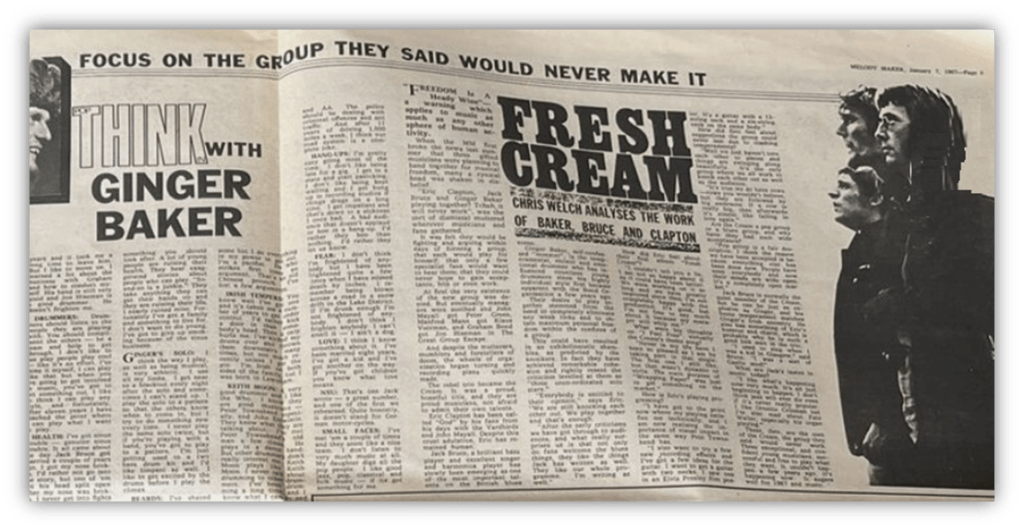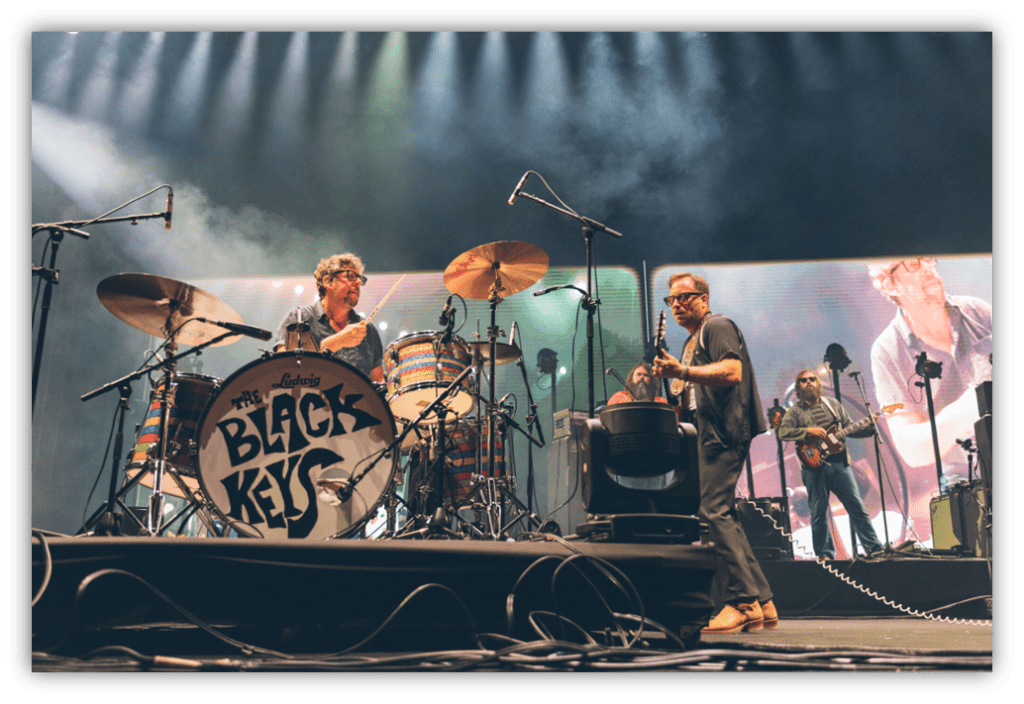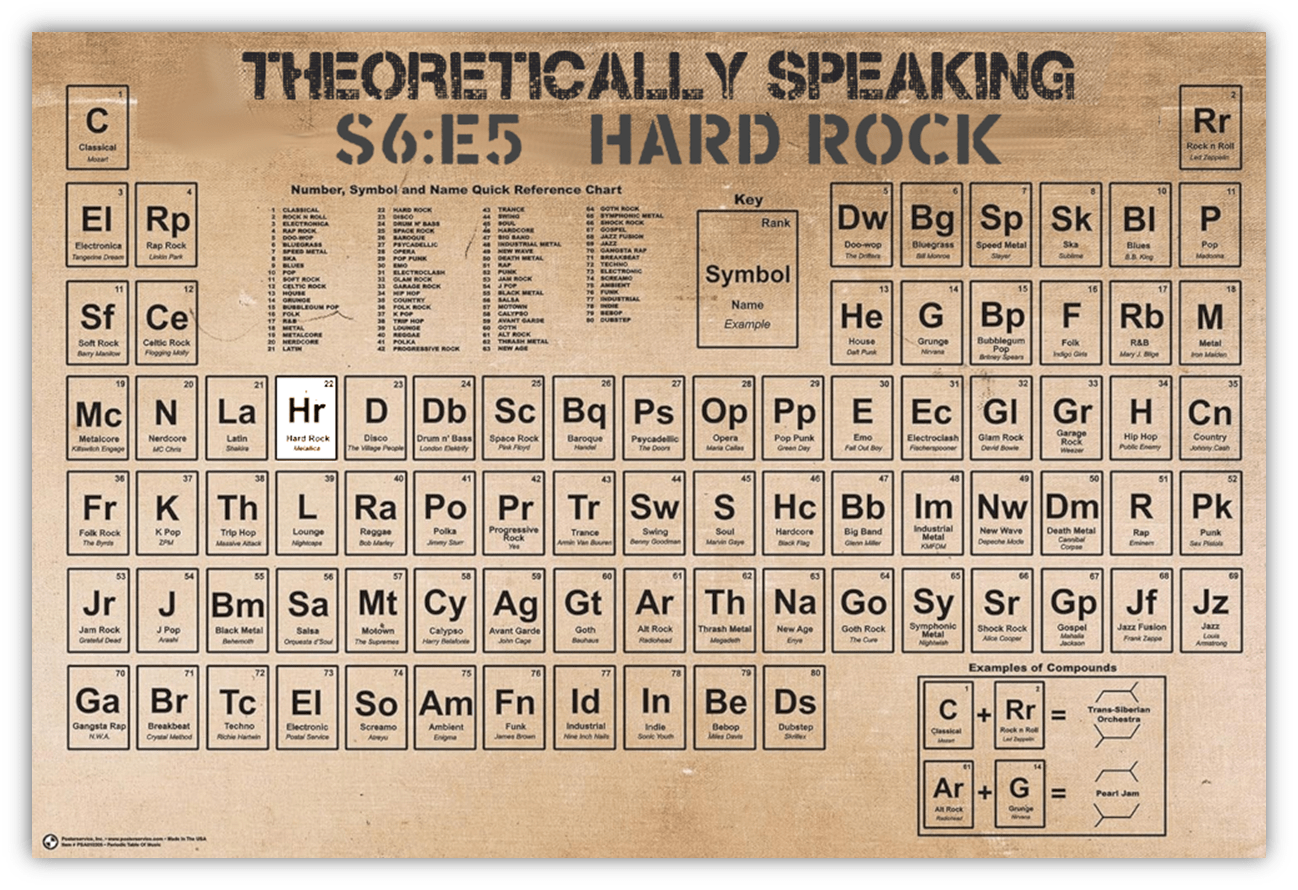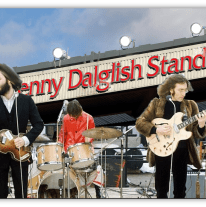
Your grandparents…

…or great-grandparents, depending on your age:
Probably thought the Rock & Roll of the 1950s was noise.
It was aggressive and threatening and unrelenting.

An assault on the ears.
The end of music.
Little did they know that music would get even more aggressive and threatening and unrelenting.
Music does indeed end – but only for those who couldn’t handle its new forms. That’s why nostalgia festivals are big business.
Feeling that music isn’t what it used to be is, of course, something that comes to all of us. Always has. If music one day evolves into noise for you, too, you’ll know you’re officially old.

At the same time, some people couldn’t stand the less aggressive stuff, like the Soft Rock we talked about in the last episode.

The Carpenters, Air Supply, and Chicago’s tamer material was just too… well, boring for these audiences. They wanted the volume loud, the tempos fast, and the adrenaline pumped.
How did this harder music develop? We have to go back to the early Blues records, and their introduction of distorted guitars.
T-Bone Walker, John Lee Hooker, Elmore James, and other guitarists made sounds that hadn’t been heard before.

Even harmonica players like Little Walter started playing through overdriven amplifiers to get that distorted sound.
Rock & Roll players, notably Chuck Berry, used that distortion, but played it over a backbeat rather than a Blues shuffle.
Vocals got more passionate, too. Big Joe Turner, Wynonie Harris, and Screamin’ Jay Hawkins shouted as much as they sang.

They’d have a huge influence on Rock & Roll singers like Little Richard, Jerry Lee Lewis, and Wanda Jackson.
When young, mostly white, and often English people heard these records, they just had to get in on the fun. The Beatles, The Rolling Stones, and the rest of the early British Invasion bands, as well as American garage rock bands, loved the loud guitars and voices, the driving beats, and the outlandish performances.
Soft Rock combined Rock & Roll with Folk music. Hard Rock combined it with electric Blues.
Through the 1960s, bands began to push the boundaries of Rock & Roll, incorporating elements of Blues, R&B, and Psychedelia into their music.

These acts took on a more dynamic and confrontational approach to Rock & Roll, setting the stage for the emergence of Hard Rock as its own genre.
One of the key developments in the evolution of Hard Rock was the power trio format. These trios had a guitarist, a bassist, and a drummer, and at least one of them sang.

This setup was popularized by bands like Cream, The Jimi Hendrix Experience, and The James Gang.
There were also quartets that were essentially a power trio plus a lead singer, like The Who, Black Sabbath, and Led Zeppelin.
Cream is often said to be the first power trio, though it’s probably more accurate to say they were the first well-known power trio.

Eric Clapton was already famous from his work with John Mayall & The Bluesbreakers and The Yardbirds, but he felt constricted in those bands.
Bassist Jack Bruce and drummer Ginger Baker had played together in the Graham Bond Organisation, but didn’t really like each other. On stage shouting matches weren’t unheard of. Bruce left to play with Manfred Mann.
Baker and Bruce tried to put their differences aside to work together with Clapton as a new band.

Despite not getting along, the three had a mutual respect and admiration for each other’s talent, and they quickly realized the potential for a groundbreaking collaboration.
They were fearless when it came to experimentation and improvisation.
Like with The Who, each member played like they were the lead instrument. Drawing from Blues, Jazz, and Psychedelia, they pushed the boundaries of what was possible in a Rock context, incorporating complex rhythms, innovative song structures, and long, improvised sections.

The news of this new band leaked to the British music press before Clapton, Bruce, and Baker told the groups they were already playing with.
That was the start of their dysfunction as a group. And though they were highly successful both artistically and commercially, they managed to stay together for only two years. It wasn’t just the bickering between Baker and Bruce. Clapton felt the other two didn’t listen to him. He once said he stopped playing, and neither noticed.
Despite their short time together, Cream’s influence on rock music cannot be overstated.

Their innovative approach to songwriting and performance laid the groundwork for the development of Heavy Metal, Progressive Rock, Blues Rock, and Jam Band music.
They inspired musicians to explore the boundaries of what was possible in a Rock context.
Cream’s virtuosic musicianship, and that of guitarists like Jimi Hendrix and Jimmy Page, pushed the limits of their instruments with blistering solos and innovative techniques.

Combining elements of Blues, Psychedelia, and Heavy Metal, these guitarists created a sound that was louder, heavier, and more aggressive than anything that had come before.
If the guitars get loud, the drums and bass have to get loud, too.
Baker, Keith Moon of The Who, and Led Zeppelin’s John Bonham pounded their drums mercilessly. Bruce, Geezer Butler from Black Sabbath, and The Who’s John Entwistle played busy, unconventional parts, and played them loud.

Entwistle used so many amplifiers on stage that his roadies nicknamed his setup “Little Manhattan” because it resembled the New York City skyline.
Hard Rock began to coalesce as a distinct genre. It was the Yin to Soft Rock’s Yang.
In the 1970s, the Blues and R&B aspects of Hard Rock were de-emphasized. The syncopated swing of the backbeat lessened, and the rhythm got even more straightforward. Not to put too fine a point on it, but it got less black and more white.
There were still Blues-inspired Hard Rock bands, like The Rolling Stones, Foghat, and ZZ Top, as well as many of the Glam Rock groups.
But others reduced their reliance on the Blues.

Golden Earring, Boston, and Blue Öyster Cult played Hard Rock with not much Blues left.
It was the golden age of Hard Rock, with bands like Bad Company, Aerosmith, and ZZ Top getting tons of radio play.

Alice Cooper, Queen, and Kiss embraced larger-than-life images and filled stadiums with their elaborate stage shows, flamboyant costumes, and anthemic songs that resonated with audiences.
It’s worth pointing out that almost all of these bands were male. An early exception was Fanny, an all female band from California.

The barriers they broke down – for The Runaways, The Go-Gos, The Bangles, and many others – should earn Fanny more recognition than they get.
There’s a Facebook group pushing to get them inducted into the Rock & Roll Hall Of Fame.
While virtuosic musicianship and technical prowess aren’t absolutely necessary in Hard Rock, they’re definitely appreciated, especially when it comes to guitar.

Ritchie Blackmore, Eddie Van Halen, and Nigel Tufnel became synonymous with the genre, dazzling audiences with their lightning-fast solos, intricate riffs, and innovative playing techniques.
This is where guitar hero worship comes from.

Beginning with the “Clapton is God” graffiti around London in the 60s, fans sometimes cared more about the guitarist and his solos than they did about the singer and lyrics.
While there were still songs about love and heartbreak, there were also songs about motorcycles, drugs, and The Lord Of The Rings. And a lot of songs about Rock itself.
We now call the Hard Rock of the 70s “Classic Rock.” Heavy Metal became its own thing, and its subgenres like Glam Metal, Thrash Metal, and Hair Metal. Some bands, like Guns N’ Roses, Metallica, and Motley Crue, walked the line between Hard Rock and Metal. Others incorporated elements of Punk, Pop, and Progressive Rock into their sound and image.
Some artists, like Aerosmith and Heart, softened their sound and had the biggest hits of their careers.

They fully embraced the production standards of the 1980s, using synths and gated drums, and they brought in professional songwriters.
Gone were the raw studio takes. Everything had a sheen on it. Some fans and critics belittled this as calculated business moves. Many turned to Metal or the parts of Punk and New Wave that would turn into Alternative Rock.
Music saw another shift in the 1990s as Grunge and Alternative Rock rose to prominence.

However, bands like Nirvana, Soundgarden, and Pearl Jam still drew heavily from the Hard Rock tradition, infusing their music with heavy guitars, anguished vocals, and strong melodies.
In the 21st century, Hard Rock still survives.
Bands like Foo Fighters, Queens of the Stone Age, and Greta Van Fleet are carrying on the tradition of their predecessors while pushing the genre in new directions.

Whether it’s the stadium-sized anthems of Foo Fighters or the gritty Blues Rock of The Black Keys, Hard Rock remains vital and relevant. It’s not as popular as it was fifty years ago, but its enduring appeal continues to influence.
The history of Hard Rock is a story of rebellion, innovation, and raw energy, tracing its roots back to the Blues and Rock & Roll of the mid-20th century and evolving into a diverse and dynamic genre that continues to captivate audiences around the world.
From the blistering guitar solos of Jimi Hendrix to the stadium-filling anthems of Foo Fighters, Hard Rock has left an indelible mark on the music world, and continues to inspire generations of musicians and fans alike.
Suggested Listening – Full YouTube Playlist

I’m Gonna Murder My Baby
Pat Hare
1954

Purple Haze
The Jimi Hendrix Experience
1967

Politician
Cream
1968

Whole Lotta Love
Led Zeppelin
1969

Walk Away
James Gang
1971

Charity Ball
Fanny
1971

School’s Out
Alice Cooper
1972

Radar Love
Golden Earring
1973

Can’t Get Enough
Bad Company
1974

Long Live Rock
The Who
1974

Tush
ZZ Top
1975

Slow Ride
Foghat
1975

Fly By Night
Rush
1975

The Boys Are Back In Town
Thin Lizzy
1976

Let There Be Rock
AC/DC
1977

We Will Rock You
Queen
1977

What About Love
Heart
1985

Janie’s Got A Gun
Aerosmith
1989

Under You
Foo Fighters
2023
Let the author know that you liked their article with a “Green Thumb” Upvote!





I imagine this was a tough one to write because so many acts called “hard rock” were like 3 other genres as well.
There was a moment in the early-to-mid 2000s when hard rock had its revival in the form of bands and singers that all harkened back to the pre-grunge days and shared a sense of kinda smug humor. Kid Rock, Buckcherry, Black Stone Cherry, Andrew W.K. come to mind. The Darkness from Britain, Airbourne from Australia. Then there was Tenacious D but they were actually genuinely funny.
I feel like no song captures the movement I’m talking about better than this one
https://www.youtube.com/watch?v=JZpxaiNV_sM
Upvoted for the greatness of our local King of Prussia band Bloodhound Gang. I LOVED their third single off the album “No Hard Feelings”.
For Link’s sake, I will not share the link.
You might cringe at these reviews for what was once ranked the 2nd worst album in all of Metacritic history:
https://www.metacritic.com/music/hefty-fine/bloodhound-gang/critic-reviews
It’s a free country…but than you. 🙂
The Darkness is a great example. I can never tell is they’re satire or not. Thanks, ISP!
I agree with ISurvivedPop, the task of writing about hard rock is thoroughly…not easy. Difficult. You get it.
Perhaps not surprisingly, aside from the most legendary titans–Hendrix, Zeppelin, Sabbath, etc.–I tend to gravitate to the strains of hard rock that are closest to punk, goth, and industrial. The Kinks, The Monks, Motorhead, Faust, Can, Plastic Ono Band, MC5, Stooges, Death. Even Van Halen, who had a punk brattiness, DLR playing like David Johansen’s more social younger brother.
To that effect, I submit this Pink Floyd song, which sounds like The Murder City Devils circa 1969:
https://www.youtube.com/watch?v=MduQlWUoyhI
Excellent write-up!
This is one of those Pink Floyd albums that I missed, even though I always see it in used record bins. Based on this song alone, I’ll pick it up next time I see it. Thanks, Phylum, it rocks!
There are only a few More songs that rock like this. Most of it is atmospheric, near-ambient soundtrack music. So, caveat emptor!
Nile Song stands out to me as the most straightforward rock song in their repertoire. One of my Floyd favourites.
It is so good, albeit far from the Pink Floyd I was familiar with in college.
There’s a lot of blurring round edges as to what falls into rock, hard rock, metal and numerous other genres, sidebars, offshoots and so on which some people get extremely vexed if acts aren’t cited in the correct place. Usually there favourite is put in the wrong category or someone they deem unworthy is attributed to their particular niche.
Thanks for making sense of it all. I’ve seen both Black Keys and White Stripes live and the noise they made with just two instruments is an impressive thing. Testament to how basic rock and roll is at heart. Sometimes all the additional frills make for something special and sometimes all you need is a basic pounding drummer and guitar.
Yes, exactly. As ISurvivedPop and Phylum have said, those blurred lines made this hard to write. Every Rock band seems to have a hyphen in its genre. Blues-Rock. Art-Rock. Garage-Rock. Rock by itself is a huge tent and I’m not sure we can really narrow Hard Rock down to a handful of representative bands, but at least the Suggested Listening has some bangers.
And sometimes, as with Royal Blood and Death From Above 1979, it’s just bass and drums!
I love that the middle of your Suggested Listening playlist was basically the Dazed and Confused soundtrack…
Hard rock may not be in its prime, but it’s definitely not dead. Sheer Mag is making some great music — from their Playing Favorites album, released about a month and a half ago:
https://youtu.be/BODk8vHyI3A?si=w1oKgGCWiTiRlP50
Wrock!
https://www.youtube.com/watch?v=gPy7boLVvWo
Funny story about your playlist:
Around 2003, a couple of friends of mine (Pat and Mark) met at my house before we went out. I’m not sure how the conversation started, but we wound up talking about “Walk Away” from the Freedom Rock collection. We couldn’t remember the band who did it, and Pat had no idea what song we were talking about, so I attempted to sing/carry its tune.
I could not for the life of me remember ANYTHING about the song except the lyric “walk away” and the guitar riff immediately following those words, except I reversed them.
Bear-na-nere…*pause*, “Walk away…”
Pat looked utterly confused.
Mark looked at me, “What was that? That’s not how the song goes!”
He proceeded to do the EXACT same guitar riff with his mouth, paused, then “walk away…”
Pat looked at us like we were Lloyd Christmas and Harry Dunne.
LOL at the Nigel Tufnel reference…
Another gem of an article – thank you!
Nice job, Virgindog! YOU ROCK!
WHAT IS THIS ROT?! I NEVER HEARD SUCH TALENTLESS NOISE IN ALL MY LIFE!!!
returns to Captain and Tennille’s Greatest Hits…